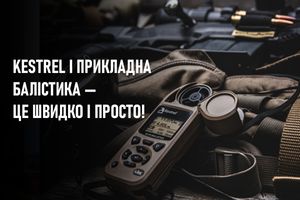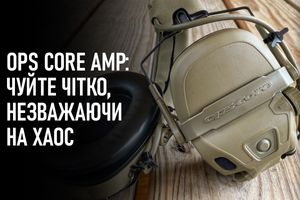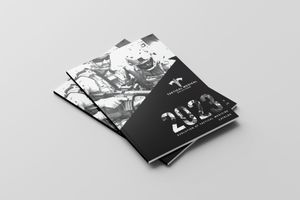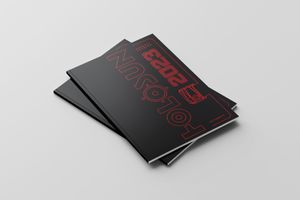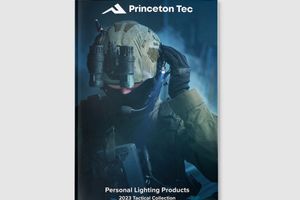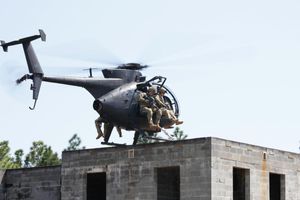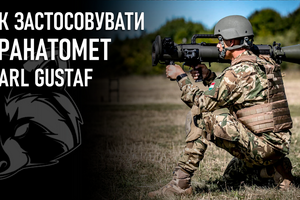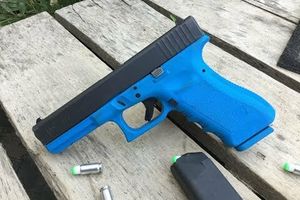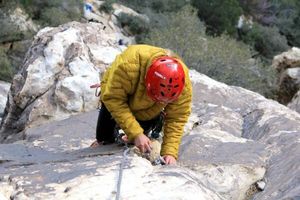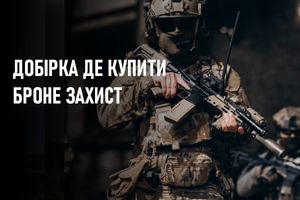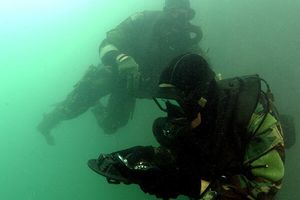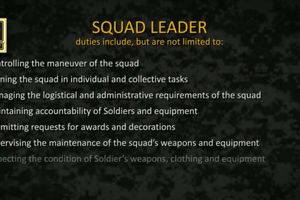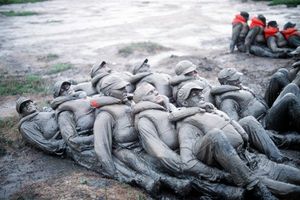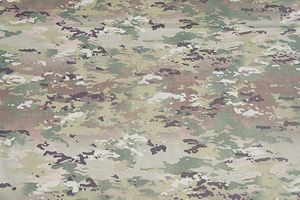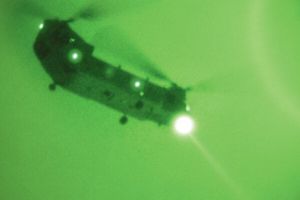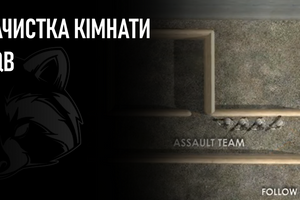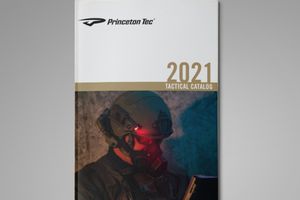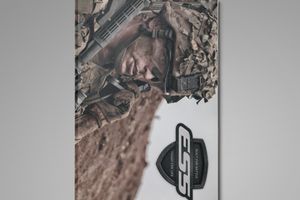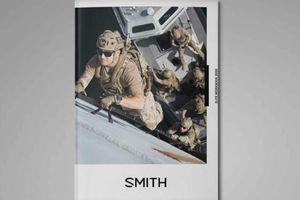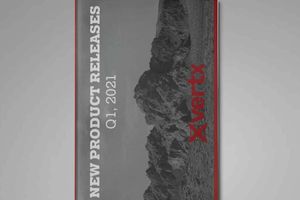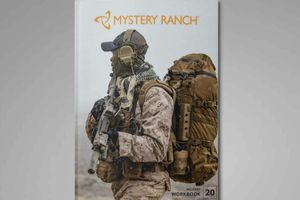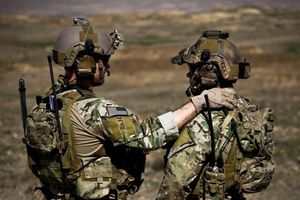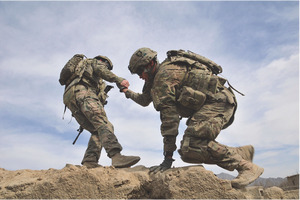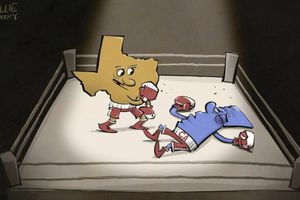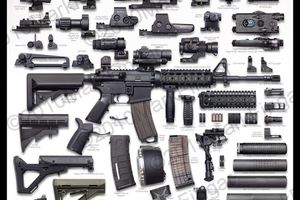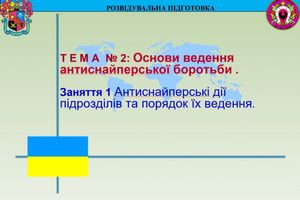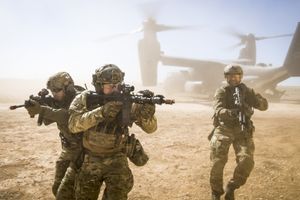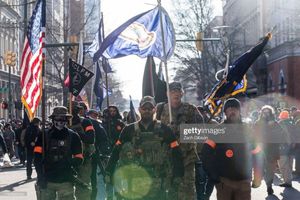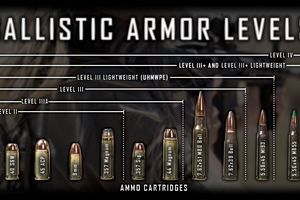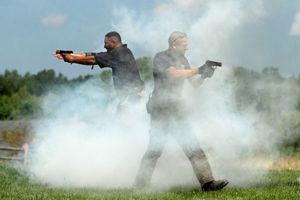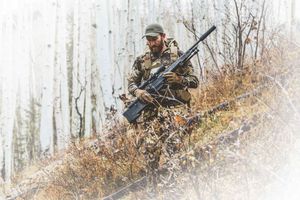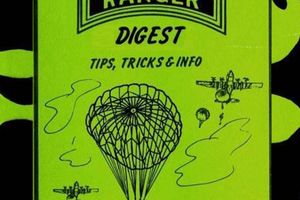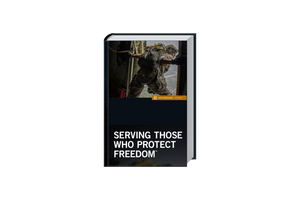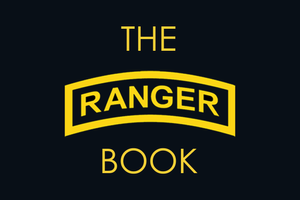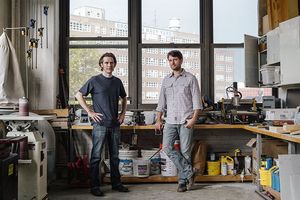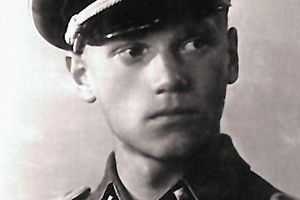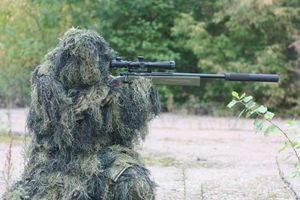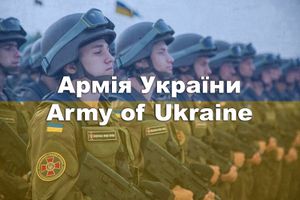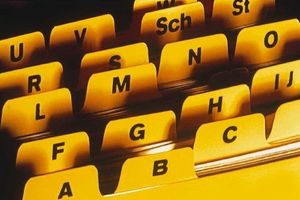Previous section: Prologue. 40 names
It was the most common black T-shirt.
Size M, 100% cotton.
On the chest was a skeleton in a wetsuit crawling along the beach. He had an M-16 in his hands and a knife on his belt. This skeleton emerged from the surf and dark waves lapped behind it. On the chest, to the left of the drawing, was a SEAL trident. The trident was the only reason why I bought this shirt in the first store I saw.
I remember the day I received the package with this T-shirt. In the village in Alaska where I grew up, there were never such T-shirts. I opened the package, put on a T-shirt and wore it almost every day. If it didn't start to smell yet, I put it on.
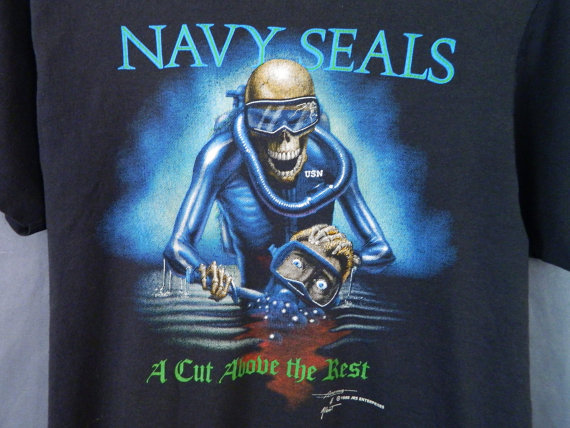
For everyone else, it was just a T-shirt that I was wearing. For me, it was the personification of my meaning in life. Every time she put it on, she reminded me of my goal to become a "SEAL." One day, I packed my T-shirt along with other things in my suitcase and went to the local airport. Thus began my journey to Washington for an event for future military personnel. It was 1992 and to be honest I don't know how I managed to get the invitation, but most likely it came from one of the many HR officers with whom I had a chance to talk about the future service in SEAL.
The "airport" was a runway on the outskirts of my village which was the only road to civilization, if that was the name of any city in Alaska.
At the far end of the runway, I saw an aircraft coming in for a landing. As soon as the pilot and passengers got off the plane, I hugged my parents goodbye, all this took place in a small building that served as an "airport" terminal.
This was my first trip. This was the first time I left Alaska alone. This was the first time I went to Washington. But most importantly, I was most impressed by the fact that I would see a "NAVY SEAL" for the first time.
Everyone in my village knew that I wanted to join SEAL. I often talked about this with my friends. I reread all the books I could find on the SEAL topic.
I knew absolutely nothing about 6th Division until I read "Rogue Warrior" by Richard Marcinko. "Demo Dick" or "Shark from the Delta" are some of his nicknames. He fought in Vietnam and later founded SEAL Team-6. The book "Rogue Warrior" tells about the creation of this unit. If you believe every word written in this book, then all "seals" can reap a thousand pounds from their chest and there is glass. Then I wanted to prove that I can do this too. Well, maybe besides glass.
Then I thought being SEAL was cool.
I knew I would have to train very hard, but I was so young that I had no idea that it would be much harder in reality. I really didn't realize the sacrifices that would have to be made. I just wanted to be like the guys I read about and that was enough to keep me moving forward with my dream.
I was lucky. I realized my destiny early. I don't think I realized it right away, but as soon as I decided to become a SEAL, I understood - this is my meaning in life, my biggest challenge. If I was asked "why?" all this, that sense of duty would be on the list of reasons, but not in the first place. The first place was taken by the urge to prove to myself that I can pass the most serious selection and training of those that are in the US armed forces. Why should I want something that comes the easy way? If it were easy, everyone would do it.
Looking back, I cannot say with certainty why I wanted to prove it to myself. All my knowledge was at the level of the books I had read, and I decided to choose the path of a "SEAL" - the path of constant self-improvement. Then I imagined that if I became a military man, I could achieve great heights.
The pilot helped me carry my suitcase and finally I was inside the plane. I waved to my parents and the plane headed for takeoff. My family was not wealthy, my parents were able to pay only part of the cost of a plane ticket, while the rest was paid by two military veterans from my village.
At Anchorage airport, I again decided to go over the route of my journey. Before the lecture with SEAL fighters, I will visit some monuments and listen to lectures from the Army and Air Force.
But the most anticipated event was the meeting with the "NAVY SEAL".
I made it to Washington and plunged into the conference. We went to the Pentagon, which looks much cooler in the movies. In fact, it is just a larger office building, only of an unusual shape. We also visited the Lincoln Monument and the Vietnam War Memorial. It was boring. The extensive list of names on the wall of the memorial was just a list for me, I never lost friends, this will happen much later in Iraq and Afghanistan. Remembering this moment, I can say that then I did not realize that one day I would also look at the list of names, similar to the list on the memorial wall, and understand what it means to lose close friends and comrades. Visiting this wall now I understand the whole grave essence of the events to which the memorial is dedicated. But while I'm a teenager and all my concentration is directed towards meeting SEAL.
Everything was planned out to the minute, getting dressed every morning, I looked at the very T-shirt that was neatly folded. I will wear it for the meeting with SEAL.
The meeting was scheduled for the evening, so after lunch I hurried to the hall where a SEAL soldier was to give a lecture. Unfortunately, when I came to the door to the hall, a woman from among the organizers blocked my way.
The lecture room was literally packed with people, but I managed to make out a few empty chairs.
I tried to squeeze through, but the woman explained that the hall was designed for a certain number of people and they all had already entered.
She apologized, but flatly refused to let me in.
As a result, a small crowd gathered outside. The SEAL lecture proved to be a very popular event. Through the doorway, I sometimes saw a "SEAL". As time went. I opened the schedule in search of other lectures, but in comparison with this there was nothing close. I didn't know what to do. Fly over four thousand miles to miss this particular lecture. At that moment, my whole journey lost its meaning, and I was broken.
Shortly before the start of the lecture, the woman who blocked my path called me. She said that the organizers decided to let several more people inside. There are only standing places. I took an empty seat and waited for the lecture to begin.
The SEAL was dressed in a green field uniform, with a black balaclava around his neck. The trousers were tucked into black and green ankle boots. His hair was much longer than the general practice of the military. Of course, he was not disgustingly shaggy, but he was far from the strict hairstyle popular among the Marines.
He looked cocky. Confident, but not cocky, and it wasn’t fake.
His lecture began with the usual material on SEAL units. SEAL is the main special unit of the Navy. The abbreviation SEAL is derived from the elements where the unit can operate - at sea, in the air and on land. President John F. Kennedy identified the need for special forces for modern warfare and approved the creation of SEAL units in parallel with the Army Special Forces. In 1961, voicing plans to land a man on the moon, Kennedy also said about investing millions of dollars in the creation and training of special military units.
The first SEAL units consisted of submarine demolition units, they were also sent to Vietnam, where they worked with the CIA in the Mekong Delta. There, the "seals" were nicknamed "people with green faces", which is associated with the camouflage make-up that soldiers often put on before going on a mission.
I listened intently, the lecture lasted about an hour. "SEAL" talked a lot about the BUD / S course. It was about the hardships of the course - there were no indulgences on BUD / S - swimming in the cold ocean and exhausting cross-country runs on a sandy beach. But talking about these difficulties only encouraged me.
After the Q&A, we had a short break before the next event. I quickly ran to my room to put on the cherished SEAL T-shirt. I figured if I could take a picture with a SEAL fighter, it would be cool if I was wearing my favorite T-shirt. When I returned to the lecture hall, the cat continued to answer questions.
I was waiting for my turn.
"Can I take a picture with you?" I asked.
He smiled and put his hand on my shoulder. If right now he told me to have a haircut or jump into the well, I would not hesitate to run to do it. As soon as we were photographed, he whispered in my ear:
“You know, in a different situation, you would have been kicked a long time ago for wearing a SEAL T-shirt without being a SEAL.
I smiled and thanked him, but at that moment I most of all wanted to take off my shirt. I ran back to my room and hid my T-shirt in the very bottom of my suitcase. I didn't wear it again. I came home and put it in the closet. I didn't want to be a poser. The comment in my address again spurred me on the way to my goal. But on the other hand, I felt that somewhere I was deceiving myself when I put on this T-shirt. Becoming a real SEAL fighter was my main goal and the meaning of life. I wanted to earn the right to wear this shirt.
Realizing my destiny, I never gave up trying to achieve it. Looking back, I think my parents instilled in me this - to live with a purpose. They were young when their life and their destiny took them to Alaska and I know how difficult it was for them.
My parents were missionaries. Vera sent them from California to Alaska, far from the comfort of big cities. My parents were not worried about the problems associated with life in the village. For them, it has become routine life in the suburbs.
We lived in a two-story house a hundred yards from the river. I so often happened to see moose near the house that at one point it ceased to amaze me. There was only one channel on the TV, and there were no radio stations. The house had running water and electricity, but there was no heating. In winter, a huge stove warmed the house. At night, my father often got up to check if she was getting warm.
A large container stood next to the stove. It was my responsibility to make sure that it was always full of firewood in winter. There was a woodpile on the porch, and when it was empty, I took an armful of firewood from the porch and put them in a container. I have never begged for pocket money for help around the house. This was my common contribution to the survival of our family in the harsh conditions of Alaska.
One of the earliest memories of elementary school is campfire lessons. Of course, we were taught how to write and read, but also taught us survival lessons at school. Each of my classmates had two attempts to light a fire using the bark of trees growing around the school. We ended up making the fire big enough to keep warm during the winter day. These trainings were aimed at so that we know how to use the skills of survival, if one day we get lost or get into some kind of trouble. Alaska is a very dangerous place if you do not know how to act in a given situation while in the wild.
In high school, my school was a long hallway with six grades. Seven children, ages seven to twelve. My senior class consisted of three students. Don't ask me what my GPA was! My interests lay far beyond the classroom.
I went hunting as often as I could. When I was a teenager, my father often took me to hunt, for a few days we went by boat up the river to set up a camp and hunt. I didn't want to sit idle. I was not at all happy with the lights of big cities, traffic jams, office work and formal suits in which people went to work day after day. Working in an office lobby was like death for me.
I bought my first rifle from my high school history teacher. It was the AR-15, the civilian version of the military M-4. I saved some money for her on a side job during the summer. And so during recess I paid the teacher seven hundred dollars, took a rifle and locked it in my locker until the end of the lessons. As soon as the bell rang, I took it out, put it in the snowmobile and went home. Yes, in winter I went to school in a snowmobile.
Everything that we could not get on the ground, we took from two stores in the city or during trips to Anchorage, where we got out every six months. Since it was far from Anchorage, all groceries were expensive. Milk in the village was $ 6 a gallon, so the parents had to buy powdered milk, which was somewhat cheaper.
The powdered milk was in massive containers and did not fit on the kitchen shelves. As a result, to make it easier to use, my mother distributed it among several plastic containers. She did the same with cereals, liquid soap and washing powder.
One morning at breakfast, I poured cereals into a large plate. Mom was at the stove making pancakes for my father. The butter was sizzling in the frying pan, I poured milk into the bowl.
I tried the porridge, but it tasted strange. Stirring the porridge with a spoon, I saw soap bubbles. I started to get up from the table to throw out the porridge, but my father stopped me.
"Eat it," he said. "This is powdered milk and it has a peculiar taste."
I tried to protest: "No, it tastes like soap!"
I never liked the taste of powdered milk anyway, but there was definitely something wrong with this porridge. I ate a whole spoonful and immediately choked. In a moment, my taste buds shut off. I felt nothing but the sourness and soapy taste of milk. Father's pancakes appeared on the table. He took one, took a bite and said:
“What's wrong with them?” He asked my mother.
Mom put down the pan of dough and sniffed the plastic container from which she took milk.
“I think I confused milk with washing powder,” she said with a smile, “that's what I think, why are the pancakes bubbling so much.”
Mom and Dad laughed. When it dawned on them, I had almost finished my plate of soapy water, they laughed even louder. I tried to laugh too, but I felt a pain in my stomach.
Mom threw out the dough and started making a new one. When she offered me a plate of normal porridge, I refused. My stomach rumbled and I was puffy for the rest of the day.
Life in Alaska was difficult, but not at times when liquid soap was in my porridge. My upbringing was unusual. And my parents chose a difficult life path because it was the only path that they could choose for themselves - to be missionaries and carry their faith. I think their way of thinking has passed on to me. This gave me the understanding and realization that everything will turn out well for me in the service.
My parents guided me on a path different from other people in my village. People did not leave here. They worked as laborers on summer part-time jobs and lived in the winter on what they managed to earn and what the land gave them. My parents pushed me towards a big dream, my own personal path. I was one of the few children who eventually planned to leave the village.
My father has always been fair to me. When he asked me to try a year of college before enrolling in the Navy, I respected his wish. He was from the generation of Vietnam and did not want anything to happen to me, but I think that he understood the essence of my desire to go to the service, since the principles of starting his missionary work were similar to mine.
And so we made a deal.
After graduating from high school, I go to a small college in southern California and I pledge to study there for at least a year. But in fact, I did not think to stay there a day longer. A year passed and I decided to go into service and take the BUD / S course.
My father was right - one year just flew by. College was fun. It was an interesting experience. My accomplishments weren't great, but I had a good time and found new friends. But the deal was done - a year passed, I decided to leave my studies.
My university did not have a Navy Reserve Officers Training Corps (ROTC) program, and the surrounding training organization was not accredited. The Army program at Cal State Fullerton admitted students from other universities, so I chose it.
ROTC is a basic officer training program. The students were trained in military science and trained physically. Once a week, ROTC students came to class in military uniform. During the day I attended my usual classes, and after them I went to the other side of the city to study military sciences. My goal at this stage was to become an officer or enlist in the Army. I just wanted to be involved in the military environment. I liked wearing the uniform, it gave me a sense of pride.
After my first year, the ROTC instructor asked if I would like to go to the US Army Parachute School in Fort Benning, Georgia. I did well in the first semester and they thought that I could not only go through the training program, but also become a real Army officer in the future.
I admitted that I could go to the parachute school, which many call the airborne training program. I learned from the SEAL books that they send guys on parachute training right after BUD / S. I thought this was a good chance to finish three weeks of training in advance. Before leaving, like the rest of my comrades, I cut my hair short.
The first morning we met at dawn on the parade ground not far from our barracks. The sun had just begun to rise above the pine trees, the air was humid and sticky. Already in the second exercise, my army gray T-shirt was wet through.
Continuation of the first chapter
Source: https://lost-unit.livejournal.com/199455.html
Author: Lost-unit










































































































































